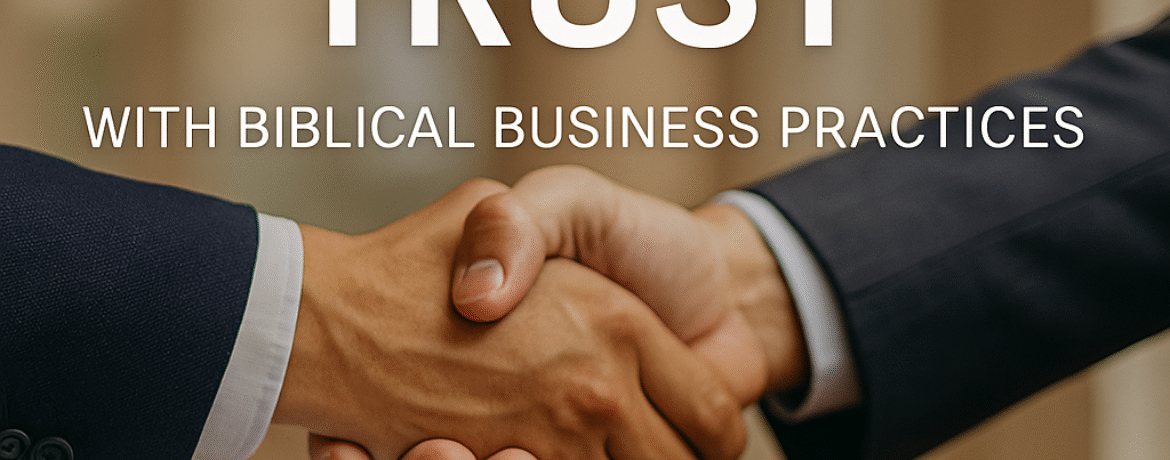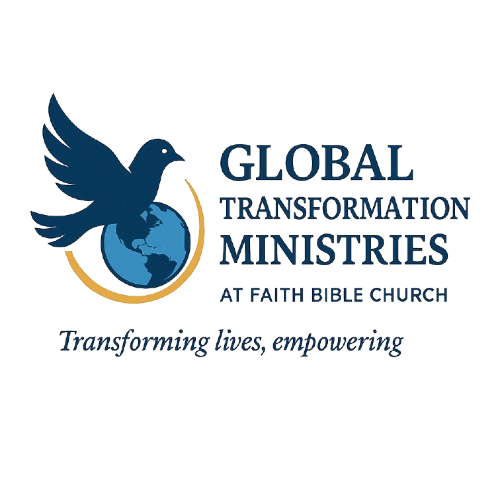
- church and society
- Daily news
Building Trust with Biblical Business Practices
Building Trust with Biblical Business Practices
| Heading Level | Title / Subheading |
|---|---|
| H1 | Building Trust with Biblical Business Practices |
| H2 | Introduction: Why Trust Matters in Business |
| H2 | Biblical Foundations of Trust in Work and Trade |
| H3 | God as the Ultimate Standard of Integrity |
| H3 | Old Testament Guidance on Fairness and Honesty |
| H3 | New Testament Teachings on Work, Service, and Trust |
| H2 | Core Biblical Business Practices That Build Trust |
| H3 | Honesty and Transparency in Dealings |
| H3 | Fair Wages and Respect for Workers |
| H3 | Servant Leadership and Humility |
| H3 | Stewardship and Accountability |
| H2 | Practical Applications for Modern Christian Business Leaders |
| H3 | Ethical Marketing and Communication |
| H3 | Responsible Supply Chain and Resource Management |
| H3 | Faith-Inspired Human Resource Practices |
| H3 | Financial Transparency and Integrity |
| H2 | Case Studies of Trust-Building Businesses |
| H3 | Historical Examples: Quakers and Early Christian Merchants |
| H3 | Modern Companies Guided by Faith Principles |
| H2 | The Role of Accountability and Community in Business |
| H3 | Internal Accountability Structures |
| H3 | External Partnerships and Witness |
| H2 | Challenges to Biblical Business Practices in Today’s World |
| H3 | Consumerism and Profit-First Culture |
| H3 | Globalization and Ethical Dilemmas |
| H3 | The Pressure of Moral Relativism |
| H2 | Integrating Faith and Business for Kingdom Impact |
| H3 | Business as Mission (BAM) |
| H3 | Kingdom Economics and Social Impact |
| H3 | Building Eternal Legacies Through Trust |
| H2 | FAQs on Building Trust with Biblical Business Practices |
| H2 | Conclusion: A Call to Faithful Business Stewardship |
Building Trust with Biblical Business Practices
Building Trust with Biblical Business Practices
Introduction: Why Trust Matters in Business
In today’s global marketplace, trust is one of the most valuable currencies. Scandals, corruption, and broken promises have eroded public confidence in corporations and institutions. Yet, businesses rooted in biblical principles of honesty, service, and stewardship stand apart as beacons of reliability.
As an academic with more than fifty years of experience at Harvard University and in ministry with Global Transformation Ministries (GTM), I have witnessed how biblical business practices not only strengthen organizations but also reflect Christ’s kingdom in the world.
This article explores how building trust through biblical business practices transforms both companies and communities—demonstrating that faith and commerce are not in conflict, but deeply complementary.
Biblical Foundations of Trust in Work and Trade
God as the Ultimate Standard of Integrity
Scripture declares: “God is not human, that he should lie” (Numbers 23:19). Trust originates in God’s unchanging character. In business, Christians mirror God’s trustworthiness when they act with integrity and consistency.
Old Testament Guidance on Fairness and Honesty
- “Do not have two differing weights in your bag—one heavy, one light” (Deuteronomy 25:13).
- “The Lord detests dishonest scales, but accurate weights find favor with him” (Proverbs 11:1).
Ancient commerce often relied on literal scales, and God demanded fairness in trade. Today, the principle applies to fair pricing, honest contracts, and transparent operations.
New Testament Teachings on Work, Service, and Trust
- “Whatever you do, work at it with all your heart, as working for the Lord” (Colossians 3:23).
- “Let your ‘Yes’ be yes, and your ‘No,’ no” (Matthew 5:37).
Trustworthiness in the New Testament is rooted in sincerity, faithful service, and consistency in word and action.
Core Biblical Business Practices That Build Trust
Honesty and Transparency in Dealings
Ephesians 4:25 commands believers to “put off falsehood and speak truthfully.” Businesses build trust when they avoid misleading claims, disclose accurate information, and uphold clarity in all agreements.
Fair Wages and Respect for Workers
James 5:4 condemns withholding wages from laborers. Modern applications include:
- Paying employees fairly.
- Providing safe working conditions.
- Honoring contracts.
Respecting workers reflects Christ’s love and strengthens organizational trust.
Servant Leadership and Humility
Jesus declared: “Whoever wants to become great among you must be your servant” (Mark 10:43). Christian leaders build trust not by wielding power but by serving employees, customers, and communities.
Stewardship and Accountability
The Parable of the Talents (Matthew 25:14–30) illustrates that leaders are stewards, not owners. Businesses must manage finances, people, and resources responsibly, accountable both to God and stakeholders.
Practical Applications for Modern Christian Business Leaders
Ethical Marketing and Communication
Truthful advertising, transparent contracts, and customer care policies demonstrate integrity. Trust grows when promises match performance.
Responsible Supply Chain and Resource Management
Biblical stewardship requires evaluating whether suppliers exploit labor, damage creation, or operate unjustly. Ethical supply chains honor God and protect trust.
Faith-Inspired Human Resource Practices
Training, mentorship, and employee care rooted in biblical principles nurture loyalty. Leaders who pray with teams, provide flexibility for family, and uphold Sabbath rest embody trust-building practices.
Financial Transparency and Integrity
Clear accounting, honest reporting, and avoidance of corrupt practices reflect Proverbs 10:9: “Whoever walks in integrity walks securely.”
Case Studies of Trust-Building Businesses
Historical Examples: Quakers and Early Christian Merchants
In the 18th century, Quaker merchants became trusted global traders because they avoided dishonest practices, honored contracts, and treated workers fairly. Their reputation made “Quaker goods” a byword for trust.
Modern Companies Guided by Faith Principles
- Chick-fil-A (Truett Cathy): Prioritized Sabbath rest and employee well-being.
- Hobby Lobby (David Green): Generosity and ethical stewardship underpin its success.
These examples show how biblical trust practices create long-term loyalty and sustainable business.
The Role of Accountability and Community in Business
Internal Accountability Structures
Ethical boards, transparent reporting systems, and strong organizational values ensure businesses remain aligned with biblical principles.
External Partnerships and Witness
When Christian businesses uphold integrity, they become witnesses in the marketplace—demonstrating Christ’s kingdom values to customers, competitors, and society.
Challenges to Biblical Business Practices in Today’s World
Consumerism and Profit-First Culture
The relentless pursuit of profit tempts businesses to compromise integrity. Yet Jesus warned: “What good is it for someone to gain the whole world, yet forfeit their soul?” (Mark 8:36).
Globalization and Ethical Dilemmas
Outsourcing and complex supply chains create challenges in maintaining ethical oversight. Biblical businesses must navigate these complexities without compromising values.
The Pressure of Moral Relativism
Today’s culture often rejects absolute standards of right and wrong. Yet Scripture provides clear moral anchors that sustain trust.
Integrating Faith and Business for Kingdom Impact
Business as Mission (BAM)
Christian entrepreneurs increasingly use business as a platform for mission—creating jobs, building trust, and sharing the gospel.
Kingdom Economics and Social Impact
Faith-driven business prioritizes people over profit and seeks to uplift communities—through fair wages, ethical investments, and philanthropy.
Building Eternal Legacies Through Trust
Matthew 6:19–21 reminds us that eternal treasures matter more than earthly success. Businesses built on trust create legacies that endure beyond balance sheets.
FAQs on Building Trust with Biblical Business Practices
Q1: Can Christian businesses be both profitable and ethical?
Yes. Research shows trust-based companies often enjoy greater loyalty and long-term profitability.
Q2: How should Christians respond to unethical industry norms?
By resisting compromise and demonstrating alternative models rooted in integrity (Acts 5:29).
Q3: Is it possible to practice biblical business in secular markets?
Absolutely. Values like honesty, fairness, and service are universally respected—even in non-Christian contexts.
Q4: How does prayer shape business decisions?
Prayer aligns leaders with God’s wisdom (James 1:5) and strengthens discernment.
Q5: Does trust-building take time?
Yes. Trust is earned through consistent action over time—but once established, it becomes a powerful competitive advantage.
Q6: How does GTM support Christian professionals in business?
At Global Transformation Ministries, we mentor leaders, teach biblical economics, and equip believers to integrate faith with business.
Conclusion: A Call to Faithful Business Stewardship
Trust is not an optional accessory in business—it is the foundation of long-term success and eternal witness. By embracing honesty, servant leadership, stewardship, and accountability, Christian business leaders reflect God’s character and invite others to trust not only them but the God they serve.
At Global Transformation Ministries, we believe biblical business practices are a catalyst for global transformation. When trust is restored in the marketplace, entire societies experience renewal.
As Jesus taught: “Let your light shine before others, that they may see your good deeds and glorify your Father in heaven” (Matthew 5:16). In business, that light is trust—anchored in biblical truth.

Welcome to Global Transformation Ministries (GTM)—where lives are restored, communities are lifted, and destinies are realigned through faith, prayer, and action in Montgomery County, Maryland and beyond
- 240-374-1814
- hello@joingtmmd.org
- Global Transformation Ministries 1645 Yale Place, Rockville, MD 20850

